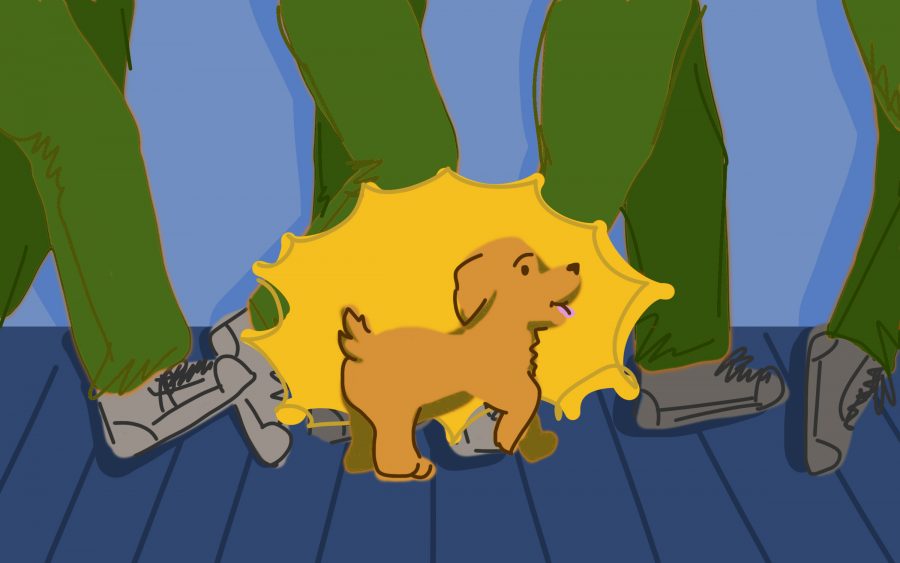Traffic comes to a standstill in the jam-packed hallway at Wallkill Correctional Facility, and a warm smile spreads across my face as I notice Charlie and Dutch trotting along with their handlers. They are both Labrador retrievers — Charlie, a three-month-old midnight-black female, and her companion, Dutch, an eight-month-old cinnamon-brown male. As they enter the housing unit, all motion comes to a halt, everyone’s attention glued to the puppies. They’re adorable. Charlie’s face gleams with pure innocence as I scratch behind her ear. She’s the newest member of the “Puppies Behind Bars” program, and so far, she seems to be adjusting well to prison life.
Launched in 1997 by Gloria Gilbert Stoga and based in New York City, Puppies Behind Bars is a nonprofit organization that raises service dogs for wounded war veterans and explosive-detection canines for law enforcement. Inspired by a similar program in Gainesville, Florida, PBB schools prison inmates in dog training, providing skills to incarcerated men and women while training the puppies to be service animals. After starting at Bedford Hills Correctional Facility for Women, the program arrived at Wallkill in 2017. Clipper and Freedom, the founding puppies of this program here at Wallkill, finished their training in July 2018. They then went on to join the Alcohol, Tobacco, Firearms and Explosives, or ATF, agency for six months of extensive training to become explosive-detection canines.
Not only does this program provide a valuable resource to society, but it also gives inmates a positive vocation to pursue once released. As an incentive, participants become eligible for Limited Credit Time Allowance, which allows them to go home six months early. But seeing them interact with the puppies, it seems many of the trainers would do the job simply for the fun of it.
“This is an opportunity for me to actually do something positive with my life,” says Charlie’s handler, Carlos Rivera, as he brushes Charlie’s lustrous coat. “It allows me to give back to the society I once harmed.”
One of his favorite aspects of the program, he adds, is the chance to bring Charlie with him to family visits.
“They are very proud of the changes I’ve made while locked up and my accomplishments with this program,” he says of his family. “Honestly, that’s what matters the most.”
Participants consider the program truly life-changing. This program reinforces an inmate’s sense of responsibility and leaves them feeling accomplished. This can be essential when an incarcerated individual is released. For someone who has broken the law and been condemned as a criminal, the puppy program offers a shot at redemption — a chance to make a good impression on society.
“These dogs are out there saving thousands of lives,” says Dutch’s handler, Paul Parks, as he beams proudly, walking Dutch around the yard. “They’re really making a difference in the world. It is amazing to be a part of something like that, to know my volunteering directly influenced a person’s life in a positive way. This goes a long way towards repaying my debt to society.”
Asked to name the biggest reward he’s gotten from the program, Parks has a ready answer.
“Honestly, I just love being around Dutch all day,” he says sincerely. “It is great just having a happy, innocent puppy following you around.” He pauses, gathering his thoughts. “The only bad part is when you have to let them go. After caring for these puppies from when they’re eight weeks old, you develop a strong bond with them. You have a companion who listens to you wholeheartedly. Even though you know he doesn’t understand you, it’s comforting. The hardest part is losing your one true friend in this lonely environment. It sucks when they leave, but they deserve a life outside of these walls.”
After doing 10 years in prison, Parks is about to be released. I ask how he hopes to apply his training on the outside.
“Ideally, I would like to open up a dog training business,” he says, explaining that he’d begin with what is called special-play-finding training, using the puppy’s favorite toy to reinforce their searching skills. “You begin by hiding the toy in easy accessible places, and then command the dog to search for it. By gradually increasing the difficulty, making the toy harder to find, the dog becomes an expert in search and find commands.”
You need serious commitment to work in this field, but its rewards are numerous — and they’re not only emotional. Participants leave with a marketable skill, helping reduce recidivism by giving inmates a legal and lucrative opportunity to focus on when released.
The dogs provide a boost of morale in the housing unit as well — especially during those fleeting moments when faces line the windows watching two black and brown blurs chase each other in their yard. It may seem ironic, the way people labeled as hardened criminals crumble in the puppies’ presence, showing them nothing but adoration. The tough facades tend to disappear when the inmates see Charlie and Dutch, allowing them to display the compassion we’re all capable of. It helps that the dogs reciprocate with faces of pure joy and love — devoid of any judgment.
This story has been approved for publication by an official with Wallkill Correctional Facility.
Joseph Beer is a student in NYU’s Prison Education Program. Email him at prison.[email protected].























































































































































